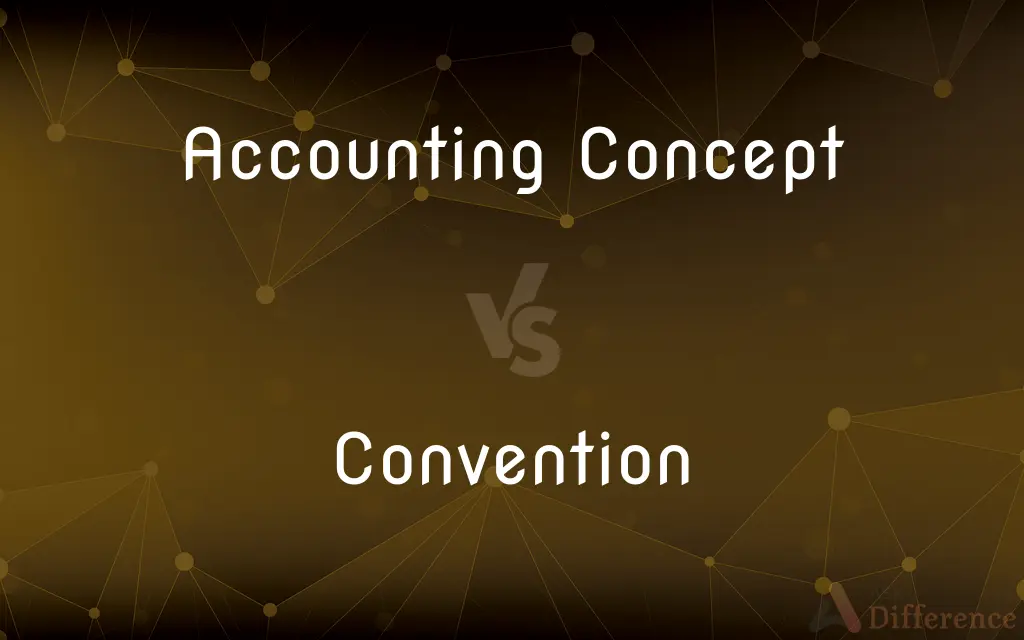Accounting Concept vs. Convention — What's the Difference?
By Tayyaba Rehman & Fiza Rafique — Published on October 3, 2023
Accounting concepts are underlying principles guiding financial recording; conventions are accepted practices or procedures.

Difference Between Accounting Concept and Convention
Table of Contents
ADVERTISEMENT
Key Differences
Accounting concepts form the theoretical foundation that governs the preparation and presentation of financial statements. These are basic assumptions or conditions upon which the science of accounting is based. On the other hand, accounting conventions are the unwritten traditions which guide accountants & financial statements users about the preparation and presentation of financial statements.
Accounting concepts, such as the going concern concept, assert that businesses should be treated as if they will continue indefinitely. Meanwhile, conventions, like the consistency convention, emphasize that once a method of accounting is adopted, it should consistently be followed from one period to another.
While accounting concepts can be seen as more "rigid," given that they form the backbone of accounting standards, conventions can be viewed as practices that have evolved over time due to the practical challenges faced in recording and reporting. They might not be universally applied but are generally accepted.
Understanding both accounting concepts and conventions is critical for any stakeholder involved in the interpretation or preparation of financial statements. While the concepts will provide a clear understanding of the fundamental ideas, conventions will guide the application in real-world scenarios.
Accounting concepts are essential for maintaining the uniformity and consistency of financial statements across different entities. On the contrary, conventions provide flexibility in certain situations, ensuring that the financial statements are meaningful and not misleading.
ADVERTISEMENT
Comparison Chart
Nature
Fundamental principles
Generally accepted practices
Basis
Theoretical foundation
Practical usage and common practice
Rigidity
Relatively rigid
More flexible
Origin
Formed the backbone of accounting standards
Evolved over time due to practical challenges
Importance
Essential for uniformity and consistency
Provides flexibility in certain situations
Compare with Definitions
Accounting Concept
A fundamental principle guiding financial recording.
Every financial transaction follows a certain accounting concept.
Convention
An accepted way of doing something.
Following the convention, minutes were recorded for the meeting.
Accounting Concept
Basic assumptions directing financial record keeping.
Due to the going concern accounting concept, assets are recorded at cost and not at their sale value.
Convention
A generally accepted practice or procedure in a particular field.
The convention in art is to sign at the bottom right corner of the painting.
Accounting Concept
Theoretical guidelines governing the preparation of financial statements.
Adhering to the accounting concept ensures clarity in financial reporting.
Convention
A tradition or custom that has gained acceptance over time.
Wearing black at funerals is a longstanding convention in many cultures.
Accounting Concept
Underlying doctrines that provide structure to accounting.
The consistency accounting concept demands uniform application in successive periods.
Convention
A widespread agreement on a particular practice.
It's a convention in business to dress formally for client meetings.
Accounting Concept
The foundational beliefs upon which accounting practices are based.
The accrual accounting concept is essential in recognizing revenue and expenses.
Convention
Established norms or standards followed by a group.
As per convention, the oldest member spoke first at the gathering.
Convention
A formal meeting of members, representatives, or delegates, as of a political party, fraternal society, profession, or industry.
Convention
The body of persons attending such an assembly
Called the convention to order.
Convention
An agreement between states, sides, or military forces, especially an international agreement dealing with a specific subject, such as the treatment of prisoners of war.
Convention
General agreement on or acceptance of certain practices or attitudes
By convention, north is at the top of most maps.
Convention
A practice or procedure widely observed in a group, especially to facilitate social interaction; a custom
The convention of shaking hands.
Convention
A widely used and accepted device or technique, as in drama, literature, or painting
The theatrical convention of the aside.
Convention
A meeting or gathering.
The convention was held in Geneva.
Convention
A formal deliberative assembly of mandated delegates.
The EU installed an inter-institutional Convention to draft a European constitution.
Convention
The convening of a formal meeting.
Convention
A formal agreement, contract, rule, or pact.
Convention
(international law) A treaty or supplement to such.
The Vienna convention at the Vienna Congress (1814-15) standardized most of diplomatic conduct for generations.
Convention
A practice or procedure widely observed in a group, especially to facilitate social interaction; a custom.
Table seatings are generally determined by tacit convention, not binding formal protocol.
The convention of driving on the right is reinforced by law.
Convention
The act of coming together; the state of being together; union; coalition.
The conventions or associations of several particles of matter into bodies of any certain denomination.
Convention
General agreement or concurrence; arbitrary custom; usage; conventionality.
There are thousands nowSuch women, but convention beats them down.
Convention
A meeting or an assembly of persons, esp. of delegates or representatives, to accomplish some specific object, - civil, social, political, or ecclesiastical.
He set himself to the making of good laws in a grand convention of his nobles.
A convention of delegates from all the States, to meet in Philadelphia, for the sole and express purpose of reserving the federal system, and correcting its defects.
Convention
An extraordinary assembly of the parkiament or estates of the realm, held without the king's writ, - as the assembly which restored Charles II. to the throne, and that which declared the throne to be abdicated by James II.
Our gratitude is due . . . to the Long Parliament, to the Convention, and to William of Orange.
Convention
An agreement or contract less formal than, or preliminary to, a treaty; an informal compact, as between commanders of armies in respect to suspension of hostilities, or between states; also, a formal agreement between governments or sovereign powers; as, a postal convention between two governments.
This convention, I think from my soul, is nothing but a stipulation for national ignominy; a truce without a suspension of hostilities.
The convention with the State of Georgia has been ratified by their Legislature.
Convention
A large formal assembly;
Political convention
Convention
Something regarded as a normative example;
The convention of not naming the main character
Violence is the rule not the exception
His formula for impressing visitors
Convention
(diplomacy) an international agreement
Convention
Orthodoxy as a consequence of being conventional
Convention
The act of convening
Common Curiosities
How do accounting concepts differ from conventions?
Accounting concepts are fundamental principles, while conventions are generally accepted practices.
Are accounting concepts universally applicable?
Yes, accounting concepts provide a universal foundation for financial reporting.
What is an accounting concept?
An accounting concept is a foundational principle that guides financial recording.
What's an example of an accounting concept?
The "going concern" concept, which assumes a business will continue indefinitely, is one example.
Who decides the accounting conventions to be followed?
Conventions evolve over time based on common practice and acceptance in the industry.
Can conventions ever become concepts?
Over time, if a convention gains universal acceptance, it might influence the development of new concepts.
Is it possible to have a clash between an accounting concept and convention?
Yes, there might be situations where a concept and convention might seem at odds, requiring professional judgment.
Why are conventions important in accounting?
Conventions offer practical flexibility in the presentation and preparation of financial statements.
How do accounting concepts impact financial statements?
They ensure financial statements are prepared under consistent and universally accepted principles.
Can an organization ignore accounting concepts?
Ignoring accounting concepts can lead to misleading or inconsistent financial statements.
How rigid are accounting conventions?
Conventions are relatively flexible, adapting to practical challenges in financial reporting.
What drives the evolution of accounting conventions?
Practical challenges in recording and reporting often drive the evolution of conventions.
Are there any risks in not following established conventions?
Not following conventions might lead to misunderstandings or misinterpretations by financial statement users.
Why is understanding both accounting concepts and conventions crucial?
Understanding both ensures accurate financial reporting and meaningful interpretation of financial statements.
Are conventions unique to accounting?
No, conventions are found in various fields, indicating accepted practices or procedures in those areas.
Share Your Discovery

Previous Comparison
Protein vs. Fat
Next Comparison
Black vs. TannedAuthor Spotlight
Written by
Tayyaba RehmanTayyaba Rehman is a distinguished writer, currently serving as a primary contributor to askdifference.com. As a researcher in semantics and etymology, Tayyaba's passion for the complexity of languages and their distinctions has found a perfect home on the platform. Tayyaba delves into the intricacies of language, distinguishing between commonly confused words and phrases, thereby providing clarity for readers worldwide.
Co-written by
Fiza RafiqueFiza Rafique is a skilled content writer at AskDifference.com, where she meticulously refines and enhances written pieces. Drawing from her vast editorial expertise, Fiza ensures clarity, accuracy, and precision in every article. Passionate about language, she continually seeks to elevate the quality of content for readers worldwide.














































